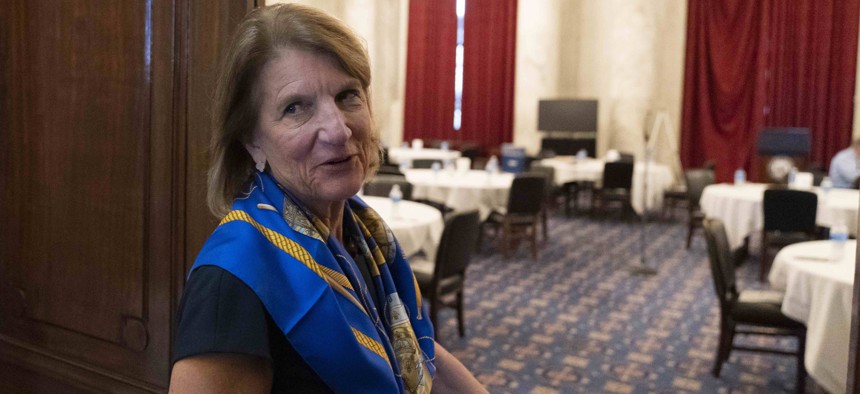Infrastructure Talks Between GOP Senators and White House are Dead

Sen. Shelley Moore Capito, R-W.Va., who was the lead GOP negotiator on infrastructure talks with the White House, arrives for a Republican caucus luncheon on Capitol Hill, Tuesday, June 8, 2021, in Washington. AP Photo/Alex Brandon

Connecting state and local government leaders
The Biden administration will now turn to working with a different bipartisan group to try to come up with a package.
Talks between a group of Republican senators and the White House over a possible infrastructure package officially collapsed on Tuesday.
West Virginia Sen. Shelley Moore Capito said in a statement that she spoke with President Biden Tuesday afternoon and "he ended our infrastructure negotiations." The White House also issued a statement making clear that the talks were over and said the administration would turn its attention toward a bipartisan group of senators who have been working on an alternative plan.
Capito had served as a point person for the Republicans throughout the talks, which have gone on for weeks now but were unable to bridge major divides over what should be included in legislation, how much money to put toward it, and how to cover the costs.
“After negotiating in good faith and making significant progress to move closer to what the president wanted, I am disappointed by his decision," she said. "Despite the progress we made in our negotiations, the president continued to respond with offers that included tax increases as his pay for, instead of several practical options that would have not been harmful to individuals, families, and small businesses."
White House Press Secretary Jen Psaki said in a statement that Biden told Capito "that the latest offer from her group did not, in his view, meet the essential needs of our country to restore our roads and bridges, prepare us for our clean energy future, and create jobs."
The president, Psaki said, "offered his gratitude" to Capito for her efforts, "but expressed his disappointment that, while he was willing to reduce his plan by more than $1 trillion, the Republican group had increased their proposed new investments by only $150 billion."
Psaki said Biden spoke Tuesday with members of the bipartisan group of lawmakers engaged in the parallel effort—including Kyrsten Sinema, an Arizona Democrat, Bill Cassidy, a Louisiana Republican, and Joe Manchin, a moderate West Virginia Democrat and a pivotal vote for Democrats in the narrowly divided Senate.
"He urged them to continue their work with other Democrats and Republicans to develop a bipartisan proposal," Psaki added.
The president has plans to be in touch with that group by phone in the coming days as he travels in Europe and has designated White House aides Steve Ricchetti, Louisa Terrell and Brian Deese to meet with the lawmakers in person.
Biden initially proposed a $2.3 trillion plan, downsized it to $1.7 trillion attempting to build bipartisan support, then last week indicated he was open to just $1 trillion in new spending.
Republicans put forward an offer last month that included $928 billion in spending over eight years, but only about $257 billion of that total sum would've been above already anticipated baseline levels.
The dollar amount was a major stumbling block. But there were other major snags as well.
Biden has pushed for a broad plan, with major investments in electric vehicle infrastructure and other initiatives to combat climate change, as well as increased spending in areas not traditionally thought of as infrastructure, like providing care for the elderly and disabled.
Republicans backed a much narrower package, focused on steel and concrete public works like water pipes and bridges, with over half of the spending going to roads and bridges.
Sen. John Barrasso, of Wyoming, who chairs the Senate Republican Conference and was involved in the White House talks, said Tuesday that the president and his team "are trying to satisfy an insatiable far-left agenda that demands massive tax hikes, and spending trillions of dollars on things unrelated to physical infrastructure."
In terms of paying for the package, Biden was adamant that he did not want to raise taxes on anyone earning under $400,000 a year and proposed taxing corporations to cover much of the cost of his proposal.
The Republican side balked at the idea of significant tax hikes on businesses. One of their marquee achievements during the Trump years was slashing corporate tax rates under a rewrite of the federal tax code and GOP lawmakers are sharply opposed to undoing that law.
Negotiators on their side proposed redirecting money previously allocated under coronavirus aid legislation to cover the costs of a public works bill. That proposal led to blowback from groups representing local governments and mayors, who had fought hard to get aid for states and localities included in the last relief bill.
Bill Lucia is a senior editor for Route Fifty and is based in Olympia, Washington.

NEXT STORY: States Invested in Broadband Expansion Despite 2020 Budget Woes





